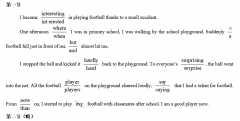2016河南省九校第一次联考英语试题及答案
河南省九校2016届高三下学期第一次联考英 语(考试时间:110分钟 试卷满分:120分)
第Ⅰ卷
第一部分 听力(略)
第二部分 阅读理解(共两节,40分)
第一节(共15小题;每小题2分,共30分)
阅读下列短文,从每题所给A、B、C、D四个选项中,选出最佳选项;并在答题卡上将该项涂黑。
A
When you are traveling, it’s vital to know about the customs and etiquette(礼仪,礼节)of the global village. What we consider polite behavior at home isn’t always accepted outside our borders.
● Etiquette of Gift Giving
Gift giving should be a happy, positive experience. When selecting a present for someone in Netherlands, don’t purchase fancy kitchen knives or scissors. Giving sharp, pointy objects as gifts is considered unlucky. Be careful when presenting flowers to a friend or a business partner in Russia. Yellow blooms suggest cheat or a relationship break up. Traditionally, red carnations are placed on the tombs of the dead. Writing cards or notes while visiting South Korea, be mindful of your pen’s ink color. Writing a person’s name in red ink traditionally suggests that the person has passed away—an important point to remember when giving a birthday card.
● Eating Customs
Being early or on time is viewed as being rude, too eager or even greedy in Venezuela. If you are invited to someone’s home for a meal, it’s recommended that you arrive 10 minutes later than the requested time. When having a meal in Egypt, don’t use the salt shaker (盐瓶). It’s insulting to your host to spread salt on your food, which means that you find the meal terrible. Japan is a very polite nation, and their fondness for etiquette extends to the use of chopsticks. According to Japanese custom, if you’re in the middle of eating, use the opposite end of your chopsticks to secure food from a shared plate. When doing business in Turkey, it’s the custom for your host to pay for your meal. Requests to split the bill won’t be accepted. If you would like to pay your fair share, Turks recommend inviting your host to a follow-up meal.
21. Which of the following is tree according to the passage?
A. You can use blue ink to write notes to your friend from South Korea.
B. Giving a fancy kitchen knife to a friend from Russia is a good choice.
C. Dining with Japanese, one can use either end of the chopsticks to get food from shared
plates.
D. Invited to a meal, one should arrive earlier to show respect for the host.
22. What does the underlined word “insulting” in Paragraph 3 refer to?
A. Respectful. B. Offensive C. Indifferent. D. Challenging.
23. where is this passage probably from?
A. A news report. B. A culture column. C. A travel essay. D. A food magazine.
B
I live in Hollywood. You may think people in such an attractive, fun—filled place are happier than others. If so, you have some mistaken ideas about the nature of happiness.
Many intelligent people still equate happiness with fun. The troth is that fun and happiness have little or nothing in common. Fun is what we experience during an act. Happiness is what we experience after an act. It is a deeper, more long—lasting emotion. Going to an amusement park or ball game, watching a movie or television, are fun activities that help us relax, temporarily forget our problems and maybe even laugh. But they do not bring happiness, because their positive effects end when the fun ends.
I have often thought that if Hollywood stars have a role to play, it is to teach us that happiness has nothing to do with fun. These rich, beautiful individuals have constant access to exciting parties, fancy cars, expensive homes, everything that spells “happiness”. But in memoir(回忆录)after memoir, celebrities reveal the unhappiness hidden beneath all their fun: depression, alcoholism, drag addiction, broken marriages, troubled children, and long—time loneliness. The way people hold on to the belief that a fun—filled, pain—free life equates happiness actually decreases their chances of ever attaining real happiness. If fun and pleasure are equated with happiness, then pain must be equated with unhappiness. But, in fact, the opposite is tree: More times than not, things that lead to happiness involve some pain.
As a result, many people avoid the very efforts that are the source of tree happiness. They fear the pain inevitably brought by such things as marriage, raising children, professional achievement, religious commitment, charitable work and self—improvement.
24. According to the passage, “fun activities” ________.
A. are the things we do before we find happiness
B. may help us relax and forget our problems sometimes
C. will lead us to the tree happiness
D. could provide long—last positive effects
25. In the author’s opinion, those Hollywood stars ________.
A. possess happiness because they are rich and famous
B. experience almost all kinds of happy things
C. tell us happiness isn’t equal to fun using their own stories
D. have to suffer a lot before they become successful
26. It is difficult for people to find real happiness because ________.
A. they believe happiness is the fun life without pain
B. they find pain equals unhappiness
C. they fear to lose what they already have in life




